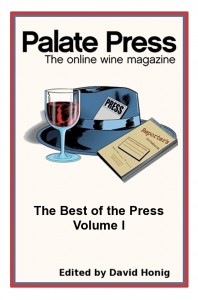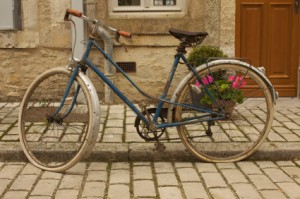 In the last five days of 2010, we are going to count down five of our favorite stories from some of our favorite authors in our first year. Today’s edition, An Education in Wine and Relationships, by Sarah Chappell, is our favorite coming of age in wine stories. It takes the reader from a stifling Brooklyn apartment to a bicycle lazily pedaled down the byways of Burgundy. This story, and all the stories featured in our last week, can be found in The Best of the Press, Volume I, available in print or as an eBook for all platforms.
In the last five days of 2010, we are going to count down five of our favorite stories from some of our favorite authors in our first year. Today’s edition, An Education in Wine and Relationships, by Sarah Chappell, is our favorite coming of age in wine stories. It takes the reader from a stifling Brooklyn apartment to a bicycle lazily pedaled down the byways of Burgundy. This story, and all the stories featured in our last week, can be found in The Best of the Press, Volume I, available in print or as an eBook for all platforms.
It took me a few days to get everything out of our Brooklyn apartment and into my parents’ house in New Jersey. I packed my clothes and shoes, and the wine I had brought back from France three months earlier. The break-up, while rooted in the simple fact that my now ex-fiancé and I did not like each other, still seemed sudden.
The six months in college I’d spent studying French in Paris had been six months too long. My fiancé had originally planned to join me for as many weeks as he could stay without procuring a visa. We would rent a flat on the Canal St. Martin and drink warm rosé out of the bottle while dangling our legs over the water. We would walk and talk and explore this ancient city, together.
But—small problem: he didn’t care much for food or wine. And evidently didn’t care much for the idea of strolling along the Seine. He did come for a brief visit, but then turned right around, heading back to New York and a job that would, he hoped, help advance his career.
Suddenly finding myself alone in Paris, I realized I had freedom for the first time in my adult life—freedom to decide what was important, to choose where to spend my money. I could, if I wished, blow my weekly budget on une carafe de Côte du Rhône and une salade avec du chèvre, perhaps with une gratin dauphinoise on the side (ok, always with une gratin dauphinoise on the side). And blow it I did. I studied my Proust and Vinaver in cafés so I could taste something new, smell something new, drink something new.
 As Spring ended and my studies wound to a close, I decided to extend my trip to travel a bit, touring France via train and bus and, in Beaune, à bicyclette. Beaune, just a few kilometers from Dijon, is smack in the middle of Burgundy’s wine region. Beautiful vineyards surrounding the town are easily accessible by the conveyance of choice for tourists—the bicycle. And being a college student, I could not miss the chance to combine drinking and possibly dangerous transportation activities.
As Spring ended and my studies wound to a close, I decided to extend my trip to travel a bit, touring France via train and bus and, in Beaune, à bicyclette. Beaune, just a few kilometers from Dijon, is smack in the middle of Burgundy’s wine region. Beautiful vineyards surrounding the town are easily accessible by the conveyance of choice for tourists—the bicycle. And being a college student, I could not miss the chance to combine drinking and possibly dangerous transportation activities.
I arrived in Beaune on a local train at 9:30 A.M. and meandered to the bike rental shop. A curmudgeonly older gentleman—who, as is traditional, insisted on responding to my French in English—gave me a much-photocopied map and highlighted the route I should follow. After handing me a tiny water bottle, certainly not enough to stay hydrated through the experience that lay ahead, and telling me where to find the best crème de cassis in France, he sent me on my way.
The route took me to five wineries, with a break mid-day for a wine tasting lunch. I recall visiting the Château de l’Ange Guardien. That’s the home of the best crème de cassis in France, and is where I blew much more than a weekly budget to ship a case of the stuff back to New York. A quick glimpse at a map tells me I probably also hit Aloxe-Corton as well. My recollection of the lunch was a stunning display of traditional French food, including the first pâté I’d ever tasted (I’m still not sure how I lived in Paris for six months without having tasted pâté), followed by my first Coq au Vin. There were wines. Many wines. And many lovely French farmers telling me about vineyard sites and climate and varietals. I just wish I could remember it.
• • •
Wine requires effort. Not effort to be enjoyed, because enjoyment of wine can be as simple as finding something to quench a thirst. But if you wish to move beyond a pleasant memory of an increasingly drunken bike ride, you must expend the kind of effort most of us last forced in college and then vowed never to use again. Learning about wine to reach a deeper enjoyment requires one to memorize strange place names and strange laws in strange languages. It’s a vast realm, but once you have a little mastery, you understand better what you are participating in when you drink wine—that ancient, perhaps even sacred, manifestation of the land.
When I returned home to Brooklyn and tried to describe my experiences to my fiancé, I was surprised to find that I remembered practically nothing about the wines and only snippets about the food. I realized I wanted more understanding—I needed it. I took a part-time summer job as a cashier at a local wine store. We were always a little short of cash, and with the store discount my newfound interest in wine would not be a budget disaster.
Working at the shop that summer, I slowly learned the difference between Chardonnay and Sauvignon blanc. I learned there were actually two famous regions in France that start with the letter B. Frequently I’d return home with a new bottle the manager had recommended—one day a southern Rhône like those to which I had become accustomed in Paris (though not nearly as cheap), the next a Nero d’Avola with a red synthetic cork that made me giggle. I’d start cooking dinner for the two of us, open the bottle, taste, and exclaim, “You must try this!”
He wasn’t interested. In fact, he was concerned. Why did I need to open a new bottle of wine? Why did I need to drink at all?
• • •
So, there I was in my childhood room for the first time in years, stunned to realize that after all this time, after allegedly growing up, I was in the same place. I’d had my future planned, but those plans didn’t come to fruition.
As it happened, my father had just enrolled in the intermediate class from the Wine and Spirit Education Trust. My father had also discovered wine through his Francophile tendencies during his college study abroad in Montpellier, and it became an increasingly important part of the table in my parents’ home. He had the same urge that I had found within myself: the need to deepen his understanding of what was in his glass. With some additional experience from the wine store under my belt, and the surprising amount of free time that comes with being single, I thought it would be fun to tag along with him to class.
Classes were held at Amanti Vino, a new wine store right in my hometown of Montclair. As owner Sharon Sevrens and manager Will Sugerman worked us through the curriculum, I began to see that not only could I learn strange things about wine in strange languages, but also that I could detect non-grape smells in fermented grape juice. Frankly, I found this mind-blowing: these unexpected smells and flavors were why I was so drawn to wine, why I had to have it.
About one month after starting the classes I had the opportunity to attend a wine pairing dinner that Amanti Vino presented with the famous importer Terry Thiese. One of the featured wines was a non-vintage rosé champagne. I swirled my glass, stuck in my nose, and recoiled. When Sharon walked by our table, I pulled her aside and asked, “This rosé, is it—?” Sharon interrupted, “You can smell that? You have a good nose! Terry was just saying the same thing.” The wine was plagued by a distinct paint thinner note resulting from volatile acidity, but according to Sharon it wasn’t easy to pick up. For the first time I thought, maybe I can do this. Maybe I can do something, on my own. Wine belonged to me, not to him. It had become an important part of my life that he could not accept, and here I was being told that I might even be good at it.
• • •
I completed the Intermediate Certificate and surprised myself by doing quite well. I graduated college and got a desk job, but I kept drinking wine, and I kept learning. Very recently I quit the desk job and took a position managing a wine store. Now I’m getting paid to drink wine. And I realize I have the opportunity to lead a life that would never have been possible had I stayed in that relationship. I wish him the best, but with all of the good juice that is coming across my palate, I’m sure I got the better end of the break-up.
 Sarah Chappell is the manager at Alphabet City Wine Company in Manhattan’s East Village. She holds the Intermediate Certificate with Distinction from the Wine and Spirit Education Trust, and is eagerly anticipating the results of her Advanced Certificate exam, which she’s pretty sure she didn’t fail. Follow her on Twitter @chapsholic.
Sarah Chappell is the manager at Alphabet City Wine Company in Manhattan’s East Village. She holds the Intermediate Certificate with Distinction from the Wine and Spirit Education Trust, and is eagerly anticipating the results of her Advanced Certificate exam, which she’s pretty sure she didn’t fail. Follow her on Twitter @chapsholic.

